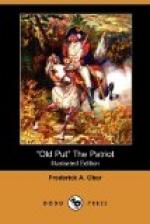“One is sometimes full of pleasure even against one’s will,” he said. “Every spiritual principle and conviction may be outraged, and yet for some unaccountable reason pleasure remains.”
Mrs. Howard opened her eyes wide as if at a sudden thought.
“Yes,” she said. “I wish it were not true what you say, but it is—and it is a great injustice.”
“What makes you say that?” Henry asked, quickly. “You were thinking of some particular thing. Do tell me.”
“I was thinking how some people can sin and err in every way, and yet there is something about them which causes them to be forgiven, and which even causes pleasure while they are sinning; and there are others who might do the same things and would be anathematised at once—and no joy felt with them at any time. Moravia and I call it having ’it’—some people have it, and some people have not got it, and that is the end of the matter!”
“It is a strange thing, but I know what you mean. I know one particular case of it in a friend of mine. No matter what he does, one always forgives him. It does not depend upon looks, either—although this actual person is abominably good-looking—it does not depend upon intelligence or character or—anything—as you say, it is just ‘it.’ Now you have it, and the Princess, perfectly charming though she is, has not.”
Sabine did not contradict him; she never was conventional, denying truths for the sake of diffidence or politeness. Moravia was beautiful and charming, but it was true she had not ‘it.’
“I think it applies more to men than to women,” was all she said.
“You were thinking of a man, then, when you spoke?”
“Yes—I was thinking of a man—but it is not an interesting subject.”
Lord Fordyce decided that it was, but he did not continue it.
“I want you to tell me all about Heronac,” he requested, “and what charmed you in it enough to make you buy it suddenly like that. How did you come upon it?”
“I had just arrived from America, at the end of July of 1908—four years ago—and I found, when I got to Cherbourg, that I could not join my friend, the Princess, as I had intended, because her husband had taken her off to his country place near Naples. So I hired a motor and wandered down into Brittany alone. I wanted to be alone. I was motoring along, when a violent storm came on, furious rain and wind, and just at the worst and weirdest moment, I passed Heronac, which is a few hundred yards from the edge of the present village. It stands out in the sea on a great spur of rock, entirely separated from the main land by a deep chasm about thirty feet wide, over which there was then a broken bridge which had once been a drawbridge. It was a huge, grim ruin with only a few roofed rooms, built in about the thirteenth century originally, and of course added to and modernized. The house actually standing within the great towers is of the date of Louis XIV. It stood there, a dark mass, defying the storm, although the huge waves splashed right up to the windows.”




